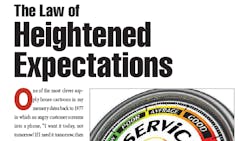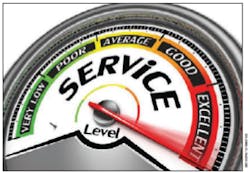The Law of Heightened Expectations
One of the most clever supply house cartoons in my memory dates back to 1977 in which an angry customer screams into a phone, “I want it today, not tomorrow! If I need it tomorrow, then I'll call you tomorrow.” This scenario conjures up an image that many readers will relate to.
The cartoon's premise is based on the impossible task of meeting a customer's expectations. A customer service professional would likely ask himself why unreasonable customers expect the impossible. From my experience, customer's expectations become heightened in incremental steps. It only takes one event to set the bar a little higher. Therefore, customers who received great service from company A would no longer be satisfied with mediocre service from company B. The natural result is that company A will benefit from the customer's heightened expectations. The outcome of this scenario is differentiation. Hence, in the 1980s, differentiation gained more prominence in the business world as a sales and marketing strategy. As sound and reliable as the differentiation strategy may appear, I suppose that the corporate world had no idea what they were in for.
Driven by technological and socioeconomic factors, heightened expectations are beyond a company's sphere of control. For example, recent technological advances such as DVR-TV (Digital Video Recorder) have heightened the expectation for immediate satisfaction. Technological advances defy the old time continuum established by television and radio during the last four or five decades. Previously, missing your favorite 8:00 p.m. television show was a lost opportunity until the rerun season afforded a second chance many months later. Television viewers and radio listeners were held captive by a rigid broadcast schedule and thereby had to defer another activity to make time for TV or radio. A person's favorite 8:00 p.m. broadcast was only available at that time – period. This is no longer true, because DVR-TV permits a person to view their favorite show whenever they choose. The emergence of time shifting in our culture continues to drive expectations even higher as customers expect and demand 24/7 access to their stuff no matter what.
Customer expectations have also changed due to the Internet. Perhaps the best example is customers who have become spoiled by Internet retailers providing a fast, efficient e-commerce fulfillment model. These customers became accustomed to placing an online order after which the ordered items magically arrive at their front door in a few days – hence a heightened expectation. The customer thinks, “I want my stuff,” and with a few mouse clicks the stuff appears just like magic.
Now that same customer would expect a similar, low maintenance and efficient result during other transactions whether they are on the Internet or in person. It is this heightened expectation that causes a customer to become impatient with a department store clerk because no one in the store knows whether an item is in stock. Witnessing the helpless store clerk page the store manager and stumble through shelves of merchandise is in stark contrast to the click of a mouse and speedy delivery. The customer begins to wonder whether his time is worth dealing with a brick and mortar department store that lacks the ability to achieve the magical “I want my stuff ” outcome. This customer continues to ponder the use of his time and this brings us back to what makes DVR-TV so attractive. Therefore, I believe that companies who can make the most of their customer's time are the ones who will win.
The technological and socio-economic advances that result in heightened expectations are growing. During the last 30 years, based on my experience, the rate of growth has been exponential. Similar to Moore's Law that states that computing power doubles every 18 to 24 months, the Law of Heightened Expectations may be equally profound and unfortunately beyond a company's sphere of control. I suppose the only things we can look forward to are more technological and socioeconomic changes, which will continue to drive customer expectations. Fasten your seat belt for technological change, which will raise the bar and further differentiate the winners from the losers.
The most successful distributors hire Steve Coscia to train their dealers and contractors in customer service and soft skills. Call Steve at 610/853-9836 or e-mail him at [email protected] to learn more about his speeches and seminars. Visit www.coscia.com to download a free 60 page e-book.

